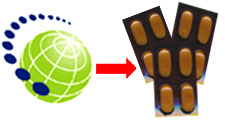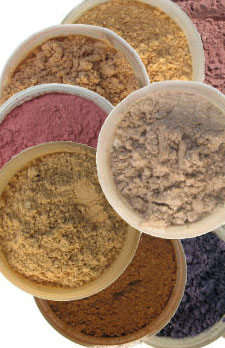|
 Chemical:
Chemical:
Dihydroergotoxine tablets (Ergoloid Mesylate)
 Excipients:
Excipients:
Lactose, corn starch, polyvinyl pyrrolidone, magnesium stearate,
talc.
 Adverse Effects:
Adverse Effects:
Side-effects occasionally reported with Dihydroergotoxine
mesylate include nausea, vomiting, headache, blurred vision, skin
rashes, nasal stuffiness, flushing of the skin, dizziness,
bradycardia, and orthostatic hypertension. Local irritation has
been reported following sublingual administration.
 Effects on the Cardiovascular System:
Effects on the Cardiovascular System:
Of 8 patients given Dihydroergotoxine mesylate 1.5 mg three
times daily for the treatment of dementia, 3 developed severe
sinus bradycardia associated with general deterioration in their
condition, necessitating withdrawal of the treatment. (1) However,
Cohen (2) reported that no sinus bradycardia had been observed in
40 elderly patients in whom the dose was built up to 1.5 mg three
times daily over 3 weeks. 1. Cayley ACD, et al. Sinus bradycardia
following treatment with Hydergine for cerebrovascular
insufficiency. Br Med J 1975- 4: 384-5. 2. Cohen C. Sinus
bradycardia following treatment with Hydergine. Br Med J 1975- 4:
581.
 Uses and Administration:
Uses and Administration:
Unlike the natural ergot alkaloids, Dihydroergotoxine
mesylate has only limited vasoconstrictor effects. It is used with
the intention of treating symptoms of mild to moderate impairment
of mental function in the elderly in doses of 3 or 4.5 mg daily by
mouth, preferably before meals. Higher doses have also been used.
It is also given sublingually in doses of 3 mg daily. Doses of 300
mcg have been given intramuscularly, subcutaneously, or by
intravenous infusion. In some countries, Dihydroergotoxine
mesylate has been used in the treatment of hypertension and in
peripheral vascular disease. Dihydroergotoxine mesylate has
been used similarly to the mesylate. References to some uses of
Dihydroergotoxine mesylate.
1. Bellani M, et al. Treatment of hypertension in the elderly: a
controlled clinical trial of dihydroergotoxine mesylate in
comparison with nifedipine. Curr Ther Res 1983- 34: 1014-22.
2. Hajioff J, Wallace M. Effect of Dihydroergotoxine
mesylate on tardive dyskinesia: a preliminary report.
Psychopharmacology (Berlin) 1983- 79: 1-3.
3. Uehlinger DE, et al. Cardiovascular regulation and lipoprotein
profile during administration of Dihydroergotoxine in
essential hypertension. Eur J Clin Pharmacol 1989- 36: 119-25.
 Senile Dementia:
Senile Dementia:
There is still much uncertainty about the use of Dihydroergotoxine
mesylate in the treatment of senile dementia. It was originally
thought to act as a peripheral and cerebral vasodilator and
vasodilatation was considered an effective treatment for senile
dementia due to cerebral ischaemia. However, cerebral ischaemia is
no longer believed to be central to the problem. Dihydroergotoxine
mesylate is now classified as a metabolic enhancer. Optimal dosage
has not been established- standard oral doses are 3 mg daily in
the US and 4.5 mg daily in Europe and Japan, but in some countries
as much as 12 mg daily is used without reports of serious
side-effects. Some workers have found little difference between
doses of 3 and 6 mg daily in patients with senile dementia,
whereas others have concluded that 6mg daily was superior in a
study of patients with multi-infarct dementia’s or mental
disturbances after stroke. The overall trend seems to be to use
larger doses, orally rather than sublingually, for longer periods.
A review in 1979 focused on 22 controlled studies of
Dihydroergotoxine mesylate in senile dementia, but although
each study showed significant improvement on some behavioral or
psychological measure, conclusions as to the therapeutic
usefulness of Dihydroergotoxine mesylate were guarded.
Improvements ranging from 11 to 21% were calculated for mood
depression, confusion, mental alertness, orientation, recent
memory, emotional lability, and self-care from 4 studies submitted
to the FDA, but specific clinical effects reported have varied
widely. Patients selected for evaluation of Dihydroergotoxine
mesylate should be limited to those with senile dementia of the
Alzheimer or multi-infarct type and the 2 groups should be
considered separately. Patients with advanced disease are unlikely
to benefit. Although many clinicians continue to regard
Dihydroergotoxine mesylate as a placebo it is one of the few
potentially effective treatments available for senile dementia of
the Alzheimer type. It is suggested that doses of at least 6 mg
daily should be given for 6 months and treatment continued,
possibly at a lower dose, if improvement or stabilization of
decline is seen- if treatment has not been successful it should be
abandoned. Hollister LE, Yesavage J.
 Ergoloid mesylates for senile dementias:
Ergoloid mesylates for senile dementias:
unanswered questions. Ann Intern Med 1984- 100: 894-8. Further
references to Dihydroergotoxine mesylate in senile dementia.
1. Huber F, et al. Effects of long-term ergoloid mesylates (`Hydergine')
administration in healthy pensioners: 5-year results. Curr Med Res
Opin 1986- 10: 256-79. 2. Orgogozo JM, Spiegel R. Critical review
of clinical trials in senile dementia- I. Postgrad Med J 1987- 63:
237-40
|







